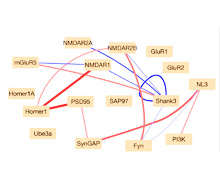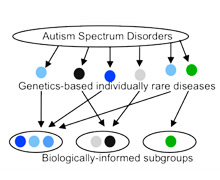SEPS Lab
Pinpointing How Autism Affects the Brain
Led by Dr. Stephen E.P. Smith, the SEPS Lab is working to uncover what the gene variations that contribute to autism have in common, opening the door to a new generation of potential treatments.
Studying a key synapse
Researchers have linked more than 100 gene mutations to autism. But it’s rare to find two children with autism who have the same mutation. This suggests that autism is not a single disease – it’s hundreds of rare, genetic diseases that cause similar symptoms.

We are looking for similarities in how these diseases affect the brain and change how it functions. Our current research focuses on the brain’s synapses, which make important calculations and help control how the brain and body function.
Each synapse contains a complex web of proteins that work together like tiny molecular machines. Many of the gene mutations linked to autism affect how these protein machines are built. We suspect this might explain why the brains of children with autism function differently than typical children’s brains.
To explore this possibility, we developed an innovative system – called quantitative multiplex immunoprecipitation – that maps out how proteins interact with each other in a synapse. We are using this system to pinpoint how different mutations affect the protein machinery at the glutamate synapse, which is where the brain processes and stores information.
This could help us understand which mutations cause the synapse to malfunction, affecting how children speak, play or interact socially. It could also help us identify when different gene mutations have similar effects on the synapse and how it process information.
Tailored autism treatments

Our long-term goal is to be able to group children with autism into categories based on how their gene mutations affect brain function. This would enable a more precise understanding of how autism varies among children. And it would open the door to new treatments that are tailored to different types of autism.
Learn more
Please visit our University of Washington lab page for more details on our research.
“Our vision is to categorize different types of autism so we can sequence patients’ genes and say ‘you have type two autism and we know which treatments work best compared to type one or type three’.”
Investigator Biography
Dr. Stephen E.P. Smith is a principal investigator at the Center for Integrative Brain Research and an assistant professor at the University of Washington School of Medicine.
Please visit Smith’s Google Scholar page to see a list of his publications.